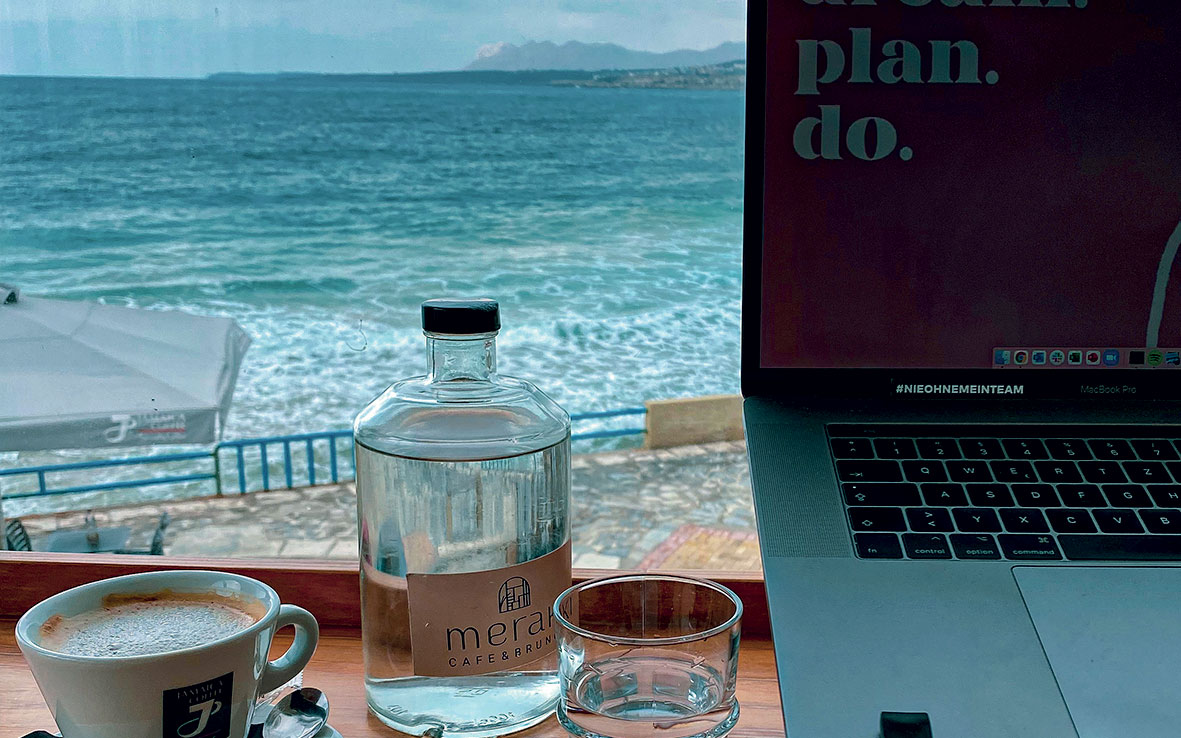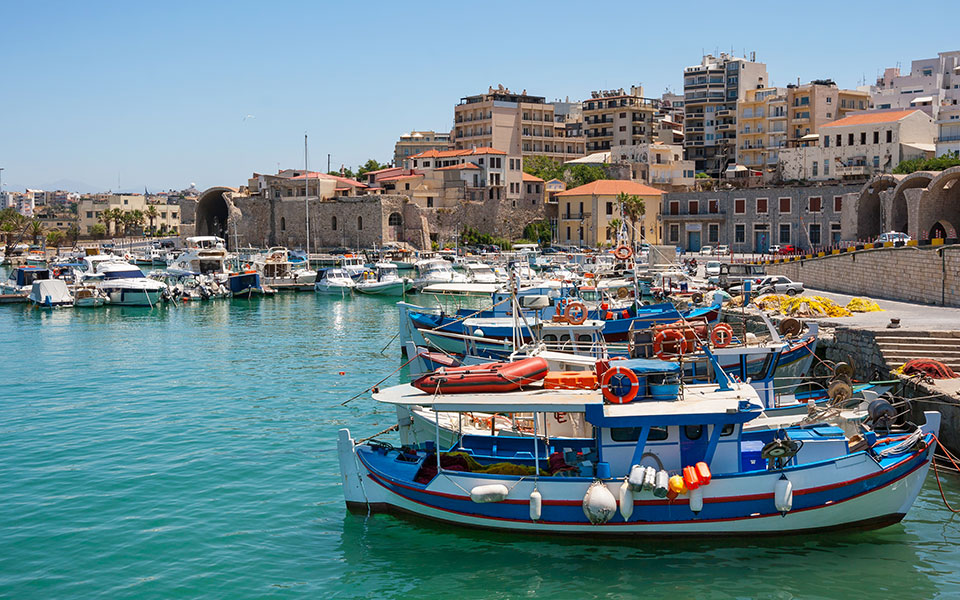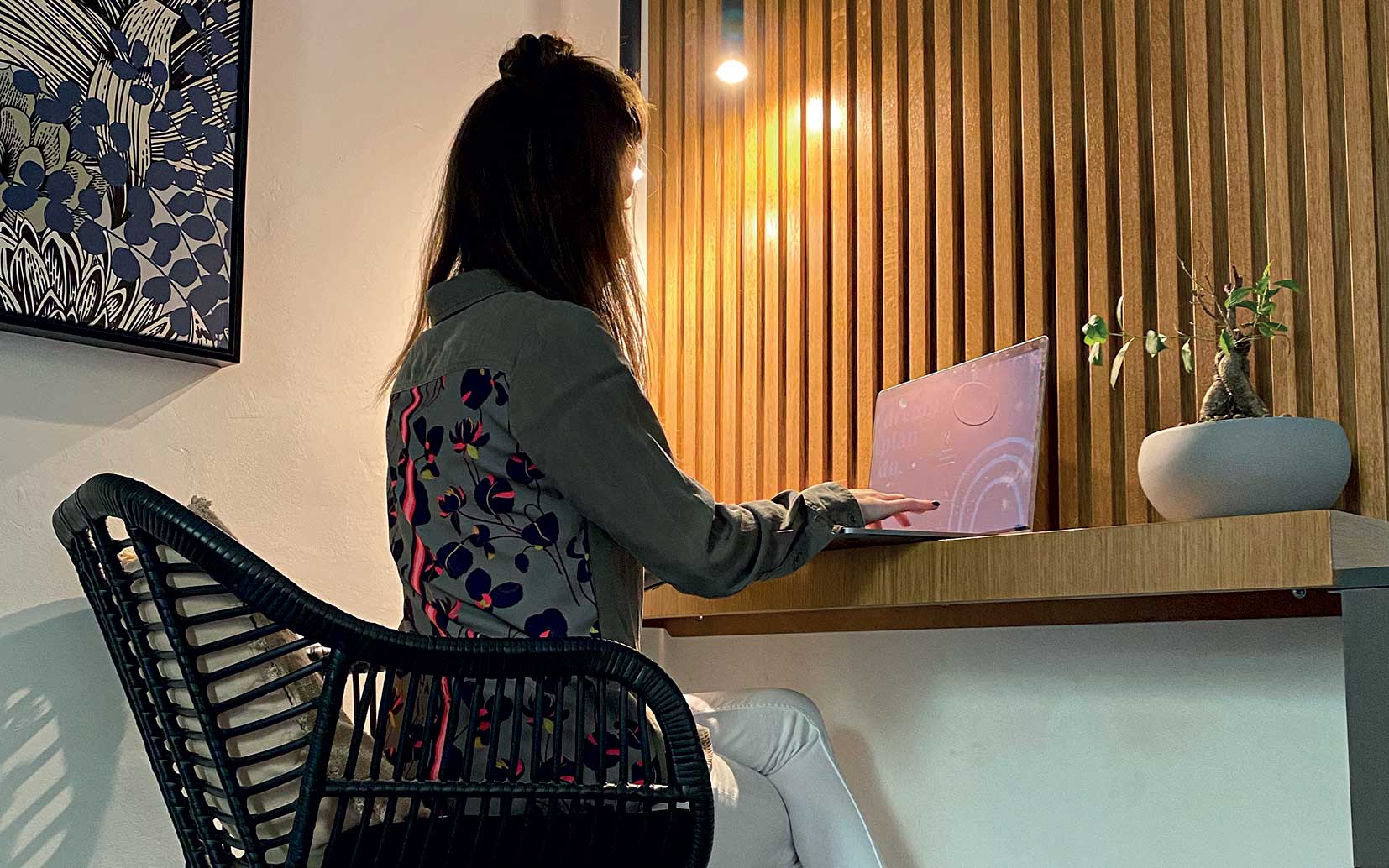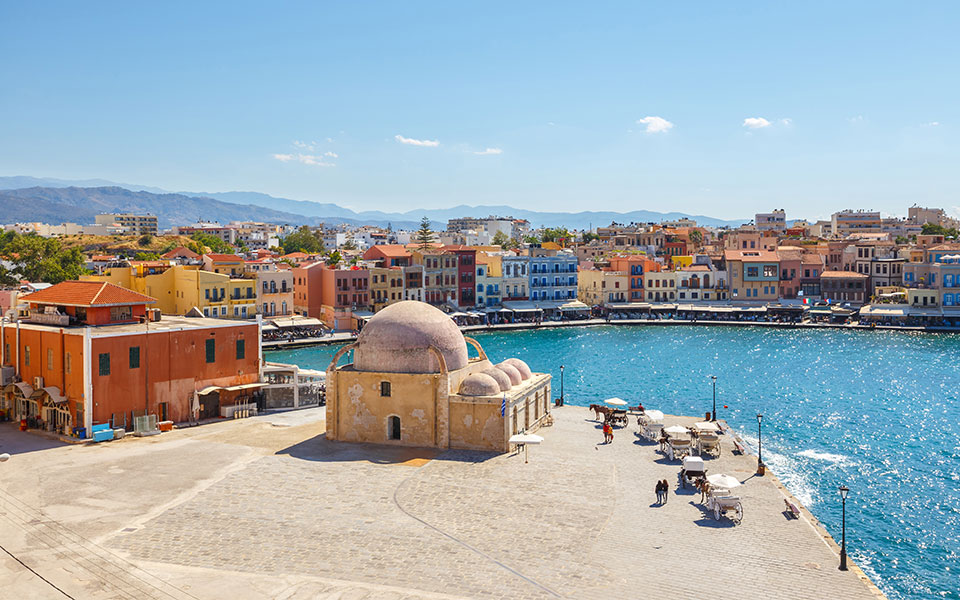Choosing to live in Greece – A digital nomad’s tale

Up until a few weeks ago, Laura would wake up in her small Airbnb apartment every morning and traverse the picturesque streets of Mohlos, exchanging greetings with the locals. In this beautiful village of the Lasithi region she would stop at one of the lovely cafes to enjoy her morning coffee, which she had learned how to order in Greek – after considerable practice with the help of the friendly waiters. Following this daily ritual, she would settle in her apartment or her favorite café, where she always had her spot and a sandwich waiting for her, and would begin working on the computer. Over the past one and a half years the 35-year old German has lived in Belgium, Hania (from November to December 2021), the Canary islands, Turkey, Portugal, and then back to Crete, in Mohlos. Today she is in Vietnam, where she plans to spend the next month. She is one of the hundred thousand digital nomads – children of the pandemic, professionals who gave up their often well-paid and steady jobs to adopt a new way of living and working.
Laura Kremer is from Hanover, Germany, and has lived in Stuttgart and Hamburg. She holds a graduate degree in public relations and a postgraduate in corporate communications, where she worked for some years. In 2016 she co-founded a startup involved in online trade, for which she worked hard, in several positions, and where she discovered her passion for e-commerce. “I made the decision to become a digital nomad gradually, during the pandemic”, she recalls. “During that time, even though Covid-19 hit many businesses hard, online trade was booming. The search for clients would suddenly take place online, and those who had not undergone a digital transformation suddenly needed an online store and presence. Many of my friends were facing work problems at the time, while my colleagues and I were working overtime”.

‘I wanted a change’
One year later, she had spent uncountable hours trapped in her apartment, working overtime. “I knew that I wanted something to change. So I got a job with a German software company that gave its employees the ability to work from anywhere in the country, as long as they had a good Wi-Fi connection.” She would see her colleagues once every two months, at the company headquarters and, even though many of them complained about the loneliness and lack of motivation they felt alone at home in front of a screen, Laura felt that she was “blooming.” “I took my suitcase and I started to travel around the country with my car, working from hotels in Dusseldorf and Cologne, from an apartment in Rostock, etc. I was enthused by the sense of freedom associated with the fact that I did not have a permanent work base, and I could work more effectively in a quiet hotel room than in an open-space office. A few weeks later, I decided to adopt the living and working lifestyle of a digital nomad”.
As such, she left her rental apartment, sold her furniture, left the rest of her belongings in her parent’s garage – where they still are today – and she set off. “I had the ability to travel to wonderful towns, but I did not have the time to see them. I had a schedule, while I would often finish the meetings late in the afternoon and then I would just go to a restaurant. Yet I wanted to be able to work not only outside the office, but with a more flexible schedule. So I decided to abandon my permanent, well-paid job. And I never regretted it.

Iraklio, Crete. [Shutterstock]
Crete and the cake
To make a living Laura started her own company, an e-commerce consultancy. And she hit the road. She arrived in Crete in December 2021. She spent her time between Iraklio and Hania, and traveled inland. She returned last July and this time settled in the east, in Molhos. “Crete is definitely the most special stop on my journey thus far. I visited the island often as a child, and later traveled to Kos and Corfu as well as to the mainland in Halkidiki. For me Greece is very special – it excites me. It was very clear that I wanted to work from there”, she says. “The hospitality of the Greeks is unlike any I have encountered. Everyone was so helpful and generous. The owner of the first Airbnb I rented also owned a bakery, and would bring me fresh cookies everyday. When the son of the family who owned the second Airbnb I stayed at had his birthday, I found an enormous cake outside my door!”
On her breaks from work she would take walks, or buy fruit and vegetables at the farmer’s market. “I met wonderful people, Greeks and other digital nomads, with whom we visited the new restaurants in town, while the weather was so good that I was still swimming in November. I would recommend traveling to Greece, whether as a digital nomad or not. For me, Greece is one of the most beautiful places in the world. The country is safe, its people are unbelievably hospitable and helpful, and let’s not talk about the landscape or the food – it is a dream!” Her advice for visitors is to “just approach the locals with an open mind, and have conversations with them, to learn more about their way of life”.

Dancing in the street
Indeed, she recalls having a wonderful time with the locals. “One day, a woman at a restaurant told me that her brother, who was a dance teacher, was organizing an event later that afternoon. Guess who took her first salsa lesson in the center of Hania? The truth is that I am rather untalented, but it was so much fun! One other time I got lost in the town and asked a man for directions. He not only showed me the way, but completely spontaneously shared a list of his favorite restaurants with me.”
Of course, she also encountered challenges, particularly with her internet connection. “I would have problems in the apartment all the time, throughout the day. When I told the owner of the café next door, she not only created a space there for me to work, but she also offered me a sandwich and a cup of Cretan mountain tea.”
One of the disadvantages of being a digital nomad on Crete is also the fact that there are few operating flights in the winter, and thus a small community of digital nomads. “Greece has great potential, but is not yet taking advantage of it fully”, she notes. “Digital nomads are a good source of income for countries, cities, hoteliers and Airbnb owners, and this trend is only increasing. Digital nomads also travel during the off-season, staying in one place for a long time. In addition to creating accommodation spaces with fast Wi-Fi, we also need to create an appealing meeting point for a diverse group of professionals with a different know-how, from all across the world.”

Safety and loneliness
Having completed almost two years of distance working and digital nomadism, she has some useful tips to share regarding the process of selecting a destination: “Of course, there are many factors to consider, not just the good weather or whether you can take a swim in the sea after work. These include internet speed, time difference, and how safe the place is for people traveling alone – especially for women. For those concerned that they would feel lonely, I would recommend finding a group for digital nomads – just type “digital nomads” and the country on Facebook. In addition to contacts, you can also pick up useful advice for a budget stay or opportunities for excursions and events.”
Even though she has not regretted her choice at all, she doesn’t know how much longer she will be living and working as a digital nomad – she says that she could perhaps even live permanently in Greece. “Distance working for me does not only mean traveling all the time and working under palm trees. The way I see it, distance working means not having to work from a specific location and benefitting from the opportunity to work from where you see fit, in order to be better and more productive. For many people, it is a great relief to not have to commute everyday, to have their peace and quiet, away from a noisy office space. Of course, there are those who also would not mind extending their vacation by one week, and to work during that time.”
Besides, she considers the idea of only being able to work efficiently seated behind a desk located in a specific building rather anachronistic. “For people who like having their colleagues and team around them, distance working can be lonely. For those who travel a lot and work at the same time, such as digital nomads, it may require a lot of organization. Yet in the end the reward is a wonderful work-life balance, or work life… on the beach.”

Is Greece a popular destination?
Enchanted by the sun, the sea and the food, frustrated by the urban and national transportation systems, and by the public healthcare system, desperately in search of fast and reliable internet connection, with a desire to join a community of digital nomads to share their advice and experiences. This more or less summarizes the profile of digital nomads who choose Greece as a destination, according to the experience and research of institutions involved in this field.
Dimitris Psaltoulis, VP of People, Blueground Co. notes a large increase in the arrival of digital nomads in Athens. The company began operations from Athens in 2013 and offers furnished, fully-equipped and appealing apartments in 26 cities around the world, which many young distance workers opt for. “In Athens we have apartments in Plaka, Kolonaki, the south and northern suburbs. Those who define themselves as digital nomads form approximately one third of our customers,” he says.
Regarding infrastructure, Greece is at a disadvantage compared to its competition. Few spaces can host and meet the expectations of digital nomads, in particular outside of Athens. There have been some investments in the capital, in Hania, Kalamata, Volos, Pilio and Thessaloniki, where there are communities of digital nomads, and corresponding efforts are being made in Ioannina, Naxos and Rhodes. The development of 5G networks has contributed to improving the speed and reliability of the internet, but problems persist. This is mostly outside Athens and other large urban centers, particularly on the islands where there is a large demand by digital nomads.
The digital nomads who select Athens are looking to stay in the city center (near the Acropolis), those who love the sea in the southern suburbs and others in the northern suburbs where a financial center has developed, Dimitris Psaltoulis clarifies. “They have a philosophy of life based on being flexible regarding their work, moving from one location to the next and distance working. They also share the desire to discover and become one with the communities they work in. They have a strong desire to integrate into the social fiber of the area, and to develop communities. This is why groups of digital nomads have appeared in Greece, for example in Hania, Pilio and Athens”, explains Nikos Diamantopoulos, Web and Digital Marketing Director of the Marketing Greece initiative to promote Greek tourism, and member of the Workfromgreece.gr platform, which focuses on digital nomads. “They claim that joining a community and spending time with people outside of work and sharing experiences is one of their basic requirements.”
A basic criterion for selecting the location they would prefer is climate, the weather, which is why we see many professionals coming to Greece from northern countries, and secondly, they consider infrastructure such as co-working spaces, where they can work and connect to reliable, fast internet,” Diamantopoulos explains. “In addition to the weather, Greece offers some of the very basic characteristics that people consider attractive – the people of Greece themselves, the feeling of warmth, hospitality and human contact. The way of life ranks very highly in the reviews of digital nomads, and is one of our country’s comparative advantages,” notes Androniki Kalfa, Marketing Executive of Marketing Greece.
Greece’s main competitors are other Mediterranean countries, such as the countries of the Iberian Peninsula, Spain and Portugal, and Italy. Our comparative advantages are known and recognized by digital nomads themselves: “the language, namely the fact that a large part of the population speaks very good English, the food and the cost, as well as easy access to the sea. And the fact that in two hours one can visit a Greek island,” according to Psaltoulis.
This article first appeared in Greece Is (www.greece-is.com), a Kathimerini publishing initiative.





